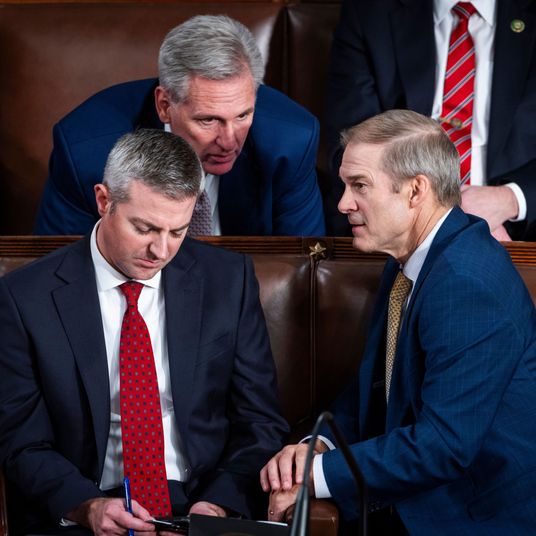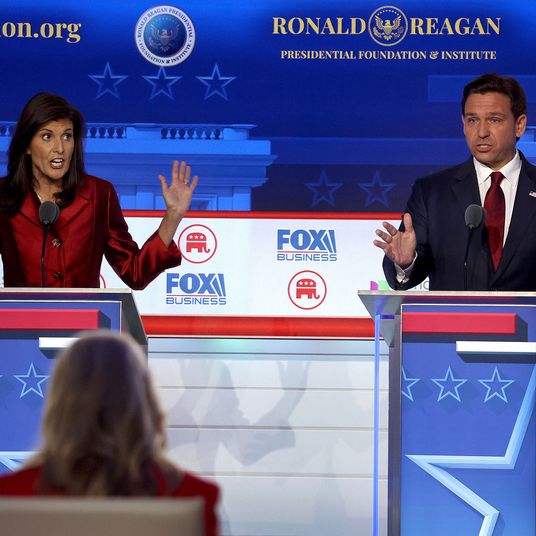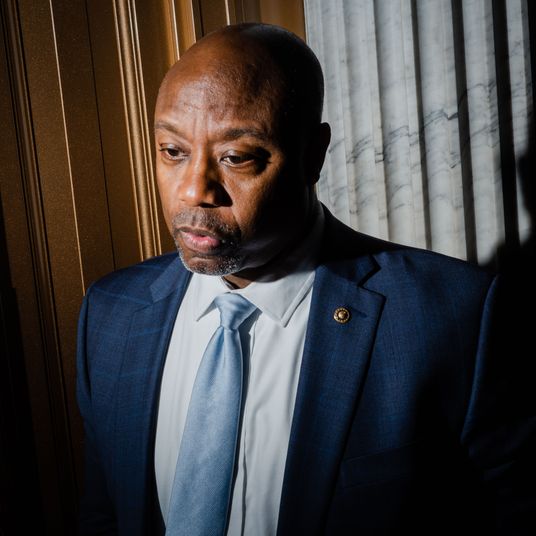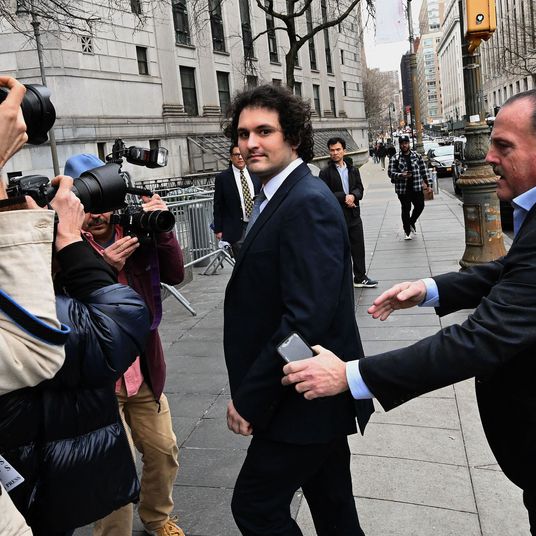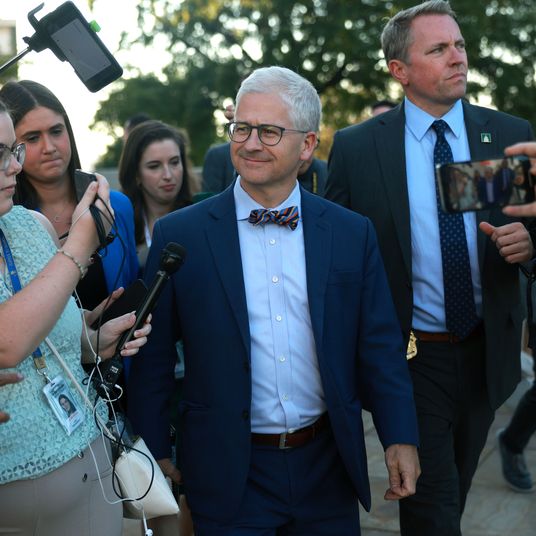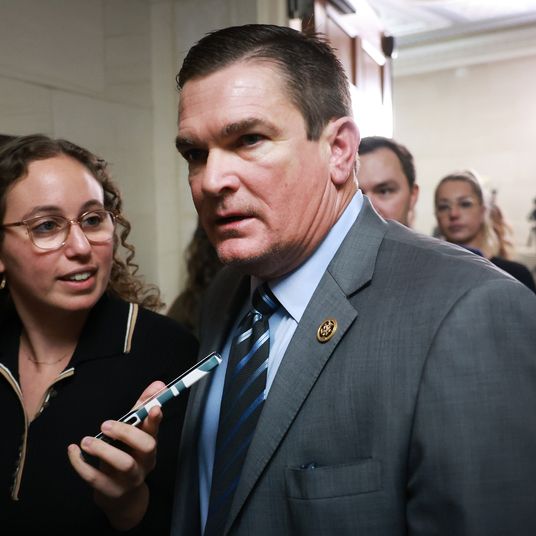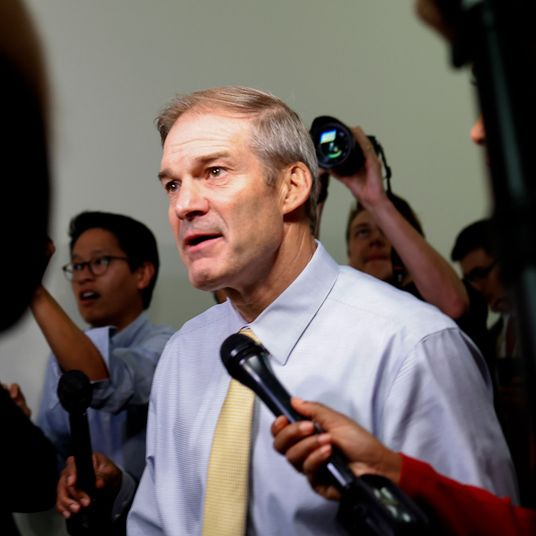
Even by the usual standards of derangement that apply, the advertisements on Super Bowl Sunday in 2022 were clearly working through some stuff. The Goddess of Fortune was enlisted to encourage people to gamble on their phones, while Facebook advertised its Metaverse technology through the story of a decommissioned animatronic character rescued from a junkyard that reunites with its friends (?) by way of a VR headset. The solutions on offer in these ads weren’t appealing, exactly, but the concerns they were addressing — wanting to place a bet on a regular-season NBA game without talking to anyone; sensing that the world of the future did not really want you — were clear enough.
The cryptocurrency exchange FTX’s big ad was entitled “Don’t Miss Out” and featured Larry David brushing off various civilization-altering innovations throughout history before doing it again with crypto. The tagline was “Don’t Be Like Larry.” It was selling “a safe and easy way to get into crypto,” but the rube-running don’t-miss-out stuff was unmistakably both the style and the substance of the ad. Do you really want to miss out on this, whatever it is? Can you afford to?
It was, somehow, just the Super Bowl before last, the one where the Rams beat the Bengals, that was loaded up with ads not so much encouraging viewers to invest in crypto as negging them toward it. A year earlier, around what now looks like that market’s peak, Spike Lee directed and starred in a commercial for a crypto ATM company called Coin Cloud that encouraged the bold and fearless to join the “digital rebellion” and get in on “the new money” (Coin Cloud filed for bankruptcy in February of this year). But by Super Bowl Sunday in 2022, cryptocurrency exchanges like FTX were both rich enough to advertise during the biggest game and secure enough in their position to simply lob a gilded FOMO fade into that valuable airspace and trust the American consumer to go grab it. In the ad, you can see the father of FTX’s founder Sam Bankman-Fried hamming it up in the background under a powdered wig.
Bankman-Fried’s father, like his mother, is a Stanford professor; Bankman-Fried himself, who is currently standing trial in federal court on seven charges of wire fraud, securities fraud, and money laundering related to his leadership of FTX, was at the time a billionaire. That everyone involved should and indeed might already have known better was obvious even then. None of this was nearly as long ago as it feels.
It is easy to see why Michael Lewis might have wanted to write a book about Bankman-Fried and FTX — they were all so rich. It is equally easy to see why the book that Lewis wrote, which is called Going Infinite, doesn’t really work. Most of the criticism that Lewis and his book have received involves how generous or credulous or just myopic the famously, professionally farsighted author was toward Bankman-Fried, with whom he either did or didn’t become “too close.” Over the course of what has been a pyrotechnically unhelpful media tour, Lewis has been unable to change the subject. His grumbling about the “mob” aligning against his book and defense of its disheveled trickster-fraudster main character have been uncharacteristically sweaty and sour; his wildly out-of-pocket suggestion that brain damage might be afflicting Michael Oher, the young offensive lineman who was not quite the protagonist of his 2004 book The Blind Side and who recently filed suit against the family that was, was shockingly callous and irresponsible.
Between Going Infinite and Walter Isaacson’s enormous biography of the increasingly daffy and grim Elon Musk, it has been a rough time for the Heroes of Capitalism genre. The future prospects for that type of book are certainly still bright; Americans aren’t going to stop revering rich people just because they are “awful” or “boring” any time soon. But the ways in which Going Infinite falls short suggests a problem that goes beyond a national shortage of sufficiently compelling or just acceptably non-sociopathic rich guys. The fact that Isaacson’s “The Genius Biographies” series has declined from Leonardo Da Vinci to Steve Jobs to Elon Musk suggests not only that the heroes are getting less heroic, but that these books’ usual signifier of genius — vast wealth — has completely decoupled from any personal merit.
Part of the fun of reading Lewis’s books — and they are fun; Going Infinite is the first Lewis book I’ve read that qualifies as anything like a tough sit — is watching him hit familiar storytelling marks. A Michael Lewis book will generally describe a stubborn, widely misunderstood problem — legacy inefficiencies in the stock market or the market for corner infielders; bubbles of systemic fraud that have been missed or willfully ignored — and then introduce characters, all of them rich-but-obscure real people, who see the solution to that problem earlier and more clearly than anyone else. Much of the satisfaction of these stories comes from how deftly Lewis explains those bigger issues and the artful, affectionate way that he colors in those characters. Lewis protagonists are not always admirable, and their motivations are not necessarily pure, but because they are correct and bold and often outside of an Establishment that is more smug or more self-interested or just slower than them, they tend to make for effective heroes.
Going Infinite fails to deliver on either half of that formula. It’s not clear in the book, as it has never really been clear anywhere else, what social or economic problem is being addressed by cryptocurrency. This is doubly true of the ad hoc lawlessness of FTX, which Bankman-Fried created primarily because he (correctly) identified the crypto market as inefficient and easily gamed. Lewis admits that cryptocurrency itself doesn’t much interest him, and he is wry in his assessment of how a concept that began as “both financial innovation and social protest” swiftly became a sprawling, speculative scamscape. For a book whose story is in large part about Bankman-Fried applying the flash-trading techniques he learned during a brief career on Wall Street to the lawless frontier of crypto trading, the acknowledgment that all of this is not just meaningless but valueless lets the air out of the story a bit.
Effective altruism, the crypto-utilitarian accumulate-to-donate philosophy that ostensibly justified Bankman-Fried’s heedless quest for “infinity dollars,” remains similarly abstract; as Jacob Bacharach notes at The New Republic, Lewis seems “appropriately and amusingly skeptical” of both its tenets and exponents. This introduces one of the comic threads that enliven a book that is otherwise about weird nerds fighting, lying, making mistakes, and fucking each other. But while he seldom fails to note the abstruse grandiosity that allows generalities about benefiting humanity to justify various smaller-scale inhumanities in the moment, Lewis does not doubt that Bankman-Fried wants to make many billions of dollars so that he can then give it away, at some point TBD, for some socially useful end, as effective altruism prescribes. The comedy is in the contrast — the reminder that all these strange, selfish, toweringly disagreeable people doing these socially useless things in a liminally legal space are actually doing them all to save humanity.
But while Lewis thinks that the chaotic casinoplex of crypto and the smug abstraction of effective altruism are both somewhat ridiculous, he never seems to doubt Bankman-Fried. He notes that Bankman-Fried at some point blithely began telling people whatever he thought they wanted to hear — and then goes on taking him at his word. Whether Lewis got “too close” to his subject during the year and change they spent together or not, he certainly wound up buying what Bankman-Fried is selling; he admits in the book’s preface that he was “totally sold” on him after their first meeting, and that affection doesn’t waver over the subsequent 255 pages, even as Bankman-Fried offhandedly wrecks nearly everything and everyone he comes into contact with. That unshakeable admiration for Bankman-Fried, taken alongside the reporting that Lewis did while witnessing Bankman-Fried’s rise and fall, introduces another, more uncanny comic element to the text.
Lewis will describe Bankman-Fried doing the things he does — which, for pretty much the entirety of the book, is whatever he wants, without any apparent care for the consequences those whims might visit on anyone or anything around him — and then offer some simultaneously overwrought and underbaked explanation or justification for those actions. “He didn’t mean to be rude,” Lewis writes early in the book. “He didn’t mean to create chaos in other people’s lives. He was just moving through the world in the only way he knew how. The cost this implied for others simply never entered his calculations. With him, it was never personal.”
All of which may be true, but it is also pretty much replacement-level asshole behavior. Lewis never quite makes whatever it was that impressed him about Bankman-Fried legible, and many of his attempts to do so back into comedy in their own right. A footnote to a quote from Bankman-Fried, an avowed book-hater, arguing that “the Bayesian priors” suggest that there have been many greater writers than Shakespeare clarifies that this is “from a blog Sam wrote as a college sophomore, but he’d made this argument as a high school junior.” It’s not the last time the reader is asked to see Bankman-Fried offhandedly dismissing something as “bullshit” as a reflection of genius, instead of being obnoxious.
Bankman-Fried is a weird guy and does plenty of weird things, but he is also never quite as brilliant as this story or the usual Lewis template would require. He’s absolutely high-handed and cold and difficult to be around in the ways that geniuses are, but any sense of his genius seems to have been reverse-engineered from how unstintingly, exhaustingly reckless and unpleasant and uncaring he is. As with Musk, the fact that Bankman-Fried was a billionaire when Lewis started reporting the book seems to not just color but retroactively justify what a turd he otherwise is; why else would this distinguished author be writing a book about him?
The insistence that Bankman-Fried is just like this, and that his mistakes, whatever they might be, were just Sam being Sam, is not convincing in the book. It has not fared better at trial, where former coworkers have revealed that they knew their misuse of customer funds was risky and wrong, and did it not just at Bankman-Fried’s direction, but with his oversight. “He believed,” Bankman-Fried’s former business and romantic partner Caroline Ellison testified, “that the ways that people tried to justify rules like ‘don’t lie’ and ‘don’t steal’ within utilitarianism didn’t work.” Whatever else that also might be, this is a classic case of “a guy doing crimes,” the only real novelty being the increasingly strained justification that it was done to maximize the future benefit to humanity.
Which, again, is very funny, in a way that augurs weirdly well for Going Infinite’s future as a sort of satire of this whole genre — all the familiar Lewis beats, but none of the familiar foresight or competence from the protagonists, all amounting to a deliriously janky waste. This is the risk of trying to fit goons like Bankman-Fried into a storytelling framework that cuts them so much slack; it’s not just that it doesn’t work, but that the deference becomes part of the gag. Imagine reading a book about a basketball player exactly as competitive, driven, sadistic, and conflicted as Michael Jordan during which it gradually becomes clear that the basketball player cannot dribble with his left hand, and hates playing defense, and also frequently struggles to tie his shoes correctly.
It says something about the failures of both Going Infinite’s literary tranche and Lewis’s judgment that Bankman-Fried’s rise and fall is presented as something like a tragedy. That the movie rights to Going Infinite sold for a reported $5 million before Lewis even began writing is its own problem, but it also opens onto a solution. Whoever adapts this story might see it more clearly as what it is — not a sad story of misunderstood genius, but a bleak comedy about a moment so cretinous and conflicted and confused that it keeps mistaking con men for seers.







